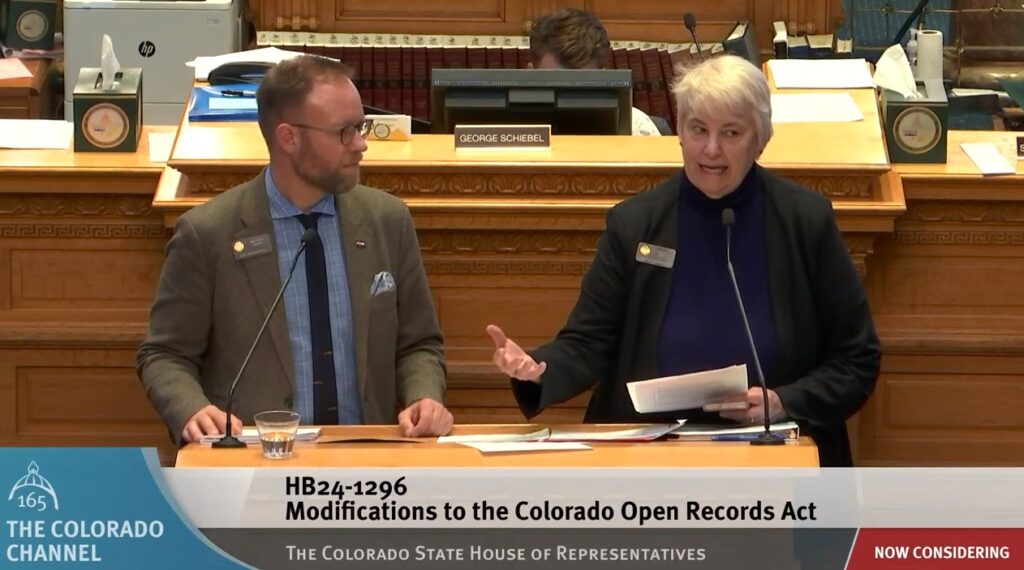By Jeffrey A. Roberts
CFOIC Executive Director
State senators Wednesday killed a bill that would have given state and local government entities more time to respond to Colorado Open Records Act requests to address what proponents called the “abuse” of CORA.
Sen. James Coleman, a Denver Democrat who chairs the five-member Senate State, Veterans and Military Affairs Committee, voted against House Bill 24-1296 along with Republican Sens. Larry Liston of Colorado Springs and Mark Baisley of Woodland Park.
The committee members didn’t explain their opposition to the measure, which changed considerably from its introduction in February by Reps. Cathy Kipp, D-Fort Collins, and Matt Soper, R-Delta, to its passage by the House less than two weeks ago.

As initially proposed by Kipp and Soper, the bill not only lengthened CORA response times but also allowed records custodians to label certain annoying or harassing people as “vexatious” and bar them from obtaining public records for 30 working days. The introduced version additionally limited public inspection of government employee calendars and included a broad new CORA exemption allowing the withholding of “any record containing information that, if disclosed, would invade another individual’s personal privacy.”
Subsequent versions modified the “vexatious” provision, deleted the vague privacy language, and also exempted journalists, as defined by Colorado’s reporter’s shield law, from the lengthened response times. The House then removed the vexatious provision altogether before sending HB 24-1296 to the Senate.
It still, however, would have limited the availability of public employee calendars and given custodians five working days, rather than CORA’s current deadline of three working days, to comply with records requests, and an additional 10 working days, rather than seven, if “extenuating circumstances” apply. Deadlines wouldn’t have changed for the news media.
The bill also allowed a records custodian to treat multiple CORA requests made by the same person within 14 days as one request — ensuring the requester got only one free hour before “research and retrieval” charges kick in.
Kipp said the bill was needed to rein in the “abuse of CORA” experienced by governmental agencies “already stretched pretty thin.” During Wednesday’s committee hearing, Sen. Janice Marchman, D-Loveland, said records custodians have been “facing situations in which a single person is bogging down (government) systems with a large number of requests, often seeking to confirm conspiracy theories or urban legends.”
The Colorado Freedom of Information Coalition opposed the additional obstacles created by HB 24-1296, especially when exorbitant fees already can be a significant barrier to obtaining public records. Because of an inflation factor built into CORA since 2014, state and local government entities starting July 1 will be allowed to charge an hourly rate to process requests that likely exceeds $40 after providing the first hour at no charge, up from the current maximum rate of $33.58. CFOIC also noted that response delays beyond CORA’s current deadlines are common.
“The burdens on the records-requesting journalist or individual are already high, and the efforts in the bill to lessen the burden on custodians have a cost to the public,” Boulder attorney Eric Maxfield, a CFOIC board member, testified Wednesday.
“An efficient government should not be accomplished at the expense of citizen rights,” added Linda Hutchinson, representing the League of Women Voters of Colorado. “And we can hardly argue that prolonging the time until records become available is anything but a curtailment of citizen rights.”
House members had added a provision to HB 24-1296 requiring members of the General Assembly to “retain public records,” as defined in CORA, for a minimum of 60 days. This presumably was meant to address criticisms from CFOIC and others about Senate Bill 24-157, the recently enacted measure that lets lawmakers communicate by email and text message without it being a “meeting” subject to the requirements of the Colorado Open Meetings Law.
Those communications are still subject to CORA. However, CORA excludes from the definition of public records “[a]ll documents prepared or assembled by a member of the general assembly relating to the drafting of bills or amendments.” A retention period of 60 days wouldn’t have applied to communications lawmakers designate as “work product” because those communications aren’t considered “public records” under the law.
Another bill still alive in the legislature, Senate Bill 24-210, would give county clerks up to 20 working days to comply with CORA requests during election seasons, except for requests made by journalists.
Follow the Colorado Freedom of Information Coalition on X (formerly Twitter) @CoFOIC. Like CFOIC’s Facebook page. Do you appreciate the information and resources provided by CFOIC? Please consider making a tax-deductible donation.




